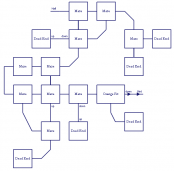Watching other people's lives can serve as an escape from our own. This is the basis for all sorts of vicarious entertainment; we record other people's lives (in stories, in writing, on film) in order to consume them. Sometimes these lives are presented as exemplary, sometimes they are cautionary, sometimes they are just other. One of the novelties of social media is that it offers a fantasy version of ourselves constructed from algorithmically processed data for this same sort of vicarious consumption; we can escape from our present self by consuming ourselves as seen through the touchsceeen.
But of course, the primary novelty of social media is that it makes possible voyeuristic surveillance that lets us endlessly spy on friends and lovers.
Part of our drive to use social media as surveillance (and what other way is there to use it?) is a search for escape, for relief. We want to see alternatives, if not generate distracting drama. But what makes the need to escape from our immediate everyday lives so pressing? If it is an attempt to find respite from social control, social-media use is a curious way of going about it, since our surveilling itself is captured and reinforces the ways we can be contained by our expressed preferences, by our data. Isn't the generalized threat of surveillance of everyone by everyone else — something we prove is real, after all, when we do it ourselves — the main thing that is reinforcing the sense that we are captured, that we have no way out? The control is coming from inside the house!
In the excellent new anthology, Unlike Us Reader: Social Media Monopolies and Their Alternatives, a paper by Mariann Hardey and David Beer looks at the ironies of social-media users tweeting about escape, noting that "it may be seen that the constantly switched-on pressures created by such media is the very thing that people might wish to escape from." As many have argued (including me!), constructing our identity and duplicating our social networks in online platforms has become a kind of capitalist production, effacing the old boundaries between "work" and "life" that structured the idea of leisure time. The pressure to perform, and thereby to produce, can build, leading to fantasies of escape — getting away to IRL. Moreover, being surveilled subjects us to what Mark Andrejevic calls the "work of being watched." Social media functions as workplace surveillance, where we are all each other's foreman, making sure we are all working diligently at manufacturing cool, getting ourselves noticed.
When we seek entertainment and relief through social media, we turn up the pressure to perform on others, which may drive them to seek voyeuristic relief, intensifying the pressure on yet someone else, and on it goes. And then, of course, our very act of watching is itself captured as a kind of performance; we can perform "paying attention to something," and see what kind of attention and approval that earns. Paying attention is as much a form of work as being paid attention to.
Using social media is probably not the best way of escaping the feeling of being subjected to social media, so then why do we try? It lets us exercise a kind of power over others, which can provide an illusory transcendence over the vulnerabilities and contingencies they are subject to, but that illusion is very tenuous, dependent on our making ourselves more available to social-media capture and control in the process. Social media may structure control itself as one long process of escape — the fantasy that the more data we produce on ourselves, the more elusive and complex we've become.
The jail is like an ever-expanding labyrinth that lets us explore new seemingly promising passageways that never lead to a way out. You just find yourself back in the center of the maze again.But if there is no way out of neoliberalism's maze, maybe social media can help with a different sort of jail. Hardley and Beer mention that escape-talk on social media often revolves around escaping the home, and the suffocations of domesticity: "This depicts the inverse of Lasch’s description of home as a ‘haven in a heartless world’ in favor of a discourse where a haven is sought in the largely anonymous audience of Twitter followers and Facebook friends." Melissa Gregg's paper "Spouse-Busters: Intimacy, adultery and surveillance technology" argues something similar: that for those with the necessary bourgeois habitus and emotional competencies, social media serves as a respite from the couple form, an escape from love jail.
Our irritation with the banalities of family life and the overreliance on a single person to meet our needs apparently makes us yearn for the escape that other relationships on social-media — relationships conducted therein as a kind of productive surveillance, a watched out for special others out there online. That is, these alternate relationships are an immediate document of themselves (they exist primarily as documentation, in mediated form), and that is part of what makes them therapeutic. But that real-time documentation is also what Bernard Stiegler would call "pharmacological" — it simultaneously exacerbates the things it is pursued to alleviate. That these relations are viewable in social media invites more intensive surveillance from the partner one is trying to momentarily "escape" from.
Surveillance on our intimates can often stem from and readily incite paranoia, the very opposite of escape. It can amplify pre-existing insecurities, and given that the amount of surveilling one can perform is essentially limitless, one can look and look until one finds something that can interpreted as validating those insecurities. If intimacy is a limited resource, you can watch your partner squandering it online and robbing you of it.
But there's no reason (besides capitalism and patriarchy) to think intimacy is a limited resource. Counter to the paranoid approach to social media and new communication technology that sees them as tools for unveiling adultery (an attitude fomented, Gregg suggests, by the "infidelity industry" that profits from domestic distrust), Gregg argues that "new forms of communal witnessing enabled by mobile and digital platforms break open the insularism of the dyadic couple, allowing a kind of everyday multiplicity to enter even the most mundane of domestic relationships."
In other words, one can have those "ambient" affairs through social media and develop intimacies that need not threaten one's primary domestic relationship. These Facebook flirtations, Twitter crushes, Tumblrs one follows, etc., should be socially tolerated, not construed as a form of infidelity. Like the so-called work spouse, these companions help get us through our day and ease the claustrophobic burden of couplehood. "Long-hours cultures produce as much as they withhold access to desirable forms of intimacy," Gregg points out. (So we can thank neoliberalism for that, anyway.)
Gregg notes that
The benefits of online intimacy here include the possibility of expanding the always limited caring capacities of the couple. Virtual friends assist and alleviate the pressure on domestic partners when work and other commitments prevent them from acting as the sole source of intimacy ... The solitude of the lunch break or the suburban commute is softened as friends literally appear in the palm of one’s hand, offering respite from the isolation of “alienated” labour, or the routine of long-term relationships.
This challenges definitions of intimacy that hinge on exclusivity, co-presence, sexual intensity, or privacy. Those have served some dubious ideological ends — the manifesto "Against the Couple Form," from the feminist journal Lies, offers a primer in some of these. But what Gregg argues in her paper is that social media, rather than exploding the couple form, may help it by offering it a pressure valve. The couple form could actually be strengthened by the way it can structure these harmless escapes with others, potentially giving intensity to otherwise dull encounters online.
But Gregg's optimism (arguably a cruel optimism) about this diversification of intimacy seems ultimately to rest with the potential for surveillance (which I am broadening here to encompass most forms of social-media interactivity among users) to not merely reinscribe suspicion and control but to foster relations of care. As David Lyon argued in his keynote speech at the Theorizing the Web 2013 conference last weekend, surveillance can generate a feeling of looking-out-for as well as a looking-at. He evoked Lévinas, and the notion that we ground who we are in our sense of responsibility for the other. Surveillance need not obfuscate this responsibility; it can remind us of it. As Zeynep Tufekci pointed out in a question during that speech, we tend to think of seeing from a distance as instrumentalizing, dehumanizing, objectifying. But it can also function, perhaps simultaneously, to subjectify that which is scrutinized. It can prompt empathy and a generous interpretation of motives, as opposed to automatically being a matter of unsympathetic monitoring.
The way for-profit companies structure social media emphasizes the instrumentalization of relations; it invites us to commodify sociality and ourselves to make it all easily consumed, disposed of. To use these systems against their grain would be to regard every voyeuristic gesture as creating a bond of responsibility, making you openly responsible for what you see and why you are looking.

